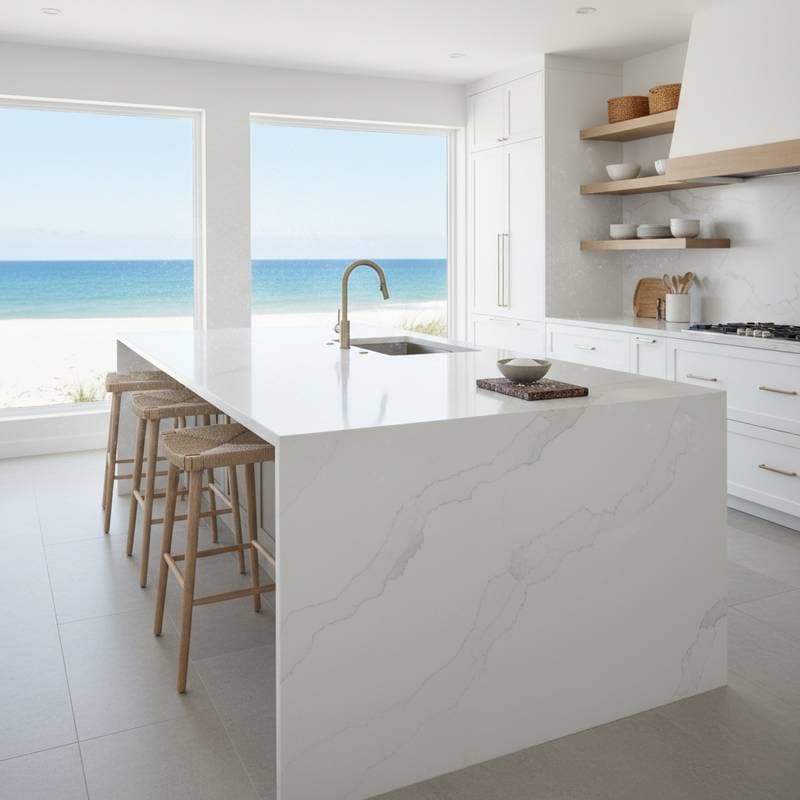Why Quartz Countertops Excel Over Granite in Coastal Kitchens
Oceanfront living delivers stunning vistas and invigorating winds, yet it exposes homes to persistent salt spray that degrades many surfaces. For those renovating kitchens by the sea, selecting countertops involves balancing style with endurance and expense. In the quartz versus granite debate for salty settings, quartz stands out for its superior toughness and simplicity in upkeep.
Cost Comparison for Installed Countertops
Both quartz and granite qualify as high-end choices, though their pricing and care demands vary significantly.
| Material | Average Cost per Square Foot (Installed) | Maintenance Frequency | Typical Lifespan |
|---|---|---|---|
| Quartz | $70–$120 | Minimal; routine wiping suffices | 25+ years |
| Granite | $60–$100 | Annual sealing advised | 20+ years |
Granite might appear more affordable initially, but its ongoing demands often tip the scales toward quartz for overall economy. In salty conditions, granite demands repeated sealing, vigilant stain removal, and occasional refinishing to combat accelerated wear and loss of luster.
Challenges Posed by Coastal Salt Exposure
Seaside breezes deposit fine salt particles on all exposed areas. These grains draw in ambient moisture, fostering gradual deterioration and mineral disruption. Porous natural stones such as granite allow salt to seep inward, resulting in:
- Etching and pitting that compromise the polished appearance
- Discoloration from trapped moisture and accumulated minerals
- Weakening along joints and borders
Engineered quartz, by contrast, features a sealed, nonporous composition that blocks salt and liquid penetration. This design ensures steadfast performance against superficial damage and embedded marks, even in properties mere paces from the surf.
Material Composition and Build Variations
Understanding construction reveals the core distinctions.
Quartz countertops blend approximately 90 to 95 percent ground natural quartz with polymer resins and colorants. This engineered composite yields a compact, impermeable layer that defies stains and elemental assaults.
Granite countertops derive from quarried stone blocks, each harboring unique blends of feldspar, mica, and quartz. These components respond variably to saline and damp conditions, yielding inconsistent resistance to breakdown and saturation.
Quartz benefits from resin reinforcement that fortifies against intrusion, whereas granite's inherent cracks and patterns serve as entryways for corrosive elements.
Upkeep Demands in Seaside Residences
Care routines highlight the most practical advantages.
Granite necessitates:
- Yearly sealing to block liquid absorption
- Prompt attention to acidic substances to prevent surface erosion
- Routine buffing to preserve gloss
Quartz demands:
- Soft cleansing using neutral soap and warm water
- Infrequent gentle buffing as needed
- No sealing, buffing compounds, or restorative treatments
Daily salt accumulation in coastal spaces amplifies quartz's appeal through its effortless regimen. Residents sidestep repetitive scrubbing and protective applications, conserving hours and funds over the years.
Resilience Against Salt and Moisture
Combined humidity and salinity forge a severe testing ground for stone. Granite's components can draw in dampness, initiating micro-fractures that salts exploit by crystallizing and exerting pressure.
Quartz maintains consistent solidity throughout. The binding resins secure the aggregate firmly, repelling ingress and expansion. Subjected to unrelenting marine influences, quartz preserves its hue, sheen, and robustness.
| Property | Quartz | Granite |
|---|---|---|
| Porosity | Nonporous | Porous |
| Salt Resistance | Excellent | Moderate |
| Humidity Resistance | Excellent | Moderate |
| Maintenance Need | Low | High |
| Color Consistency | Uniform | Varies by slab |
Practical Strategies for Cost Efficiency
- Select pale shades to mask salt marks and moisture traces.
- Favor satin or textured finishes over glossy ones to minimize visible smudges.
- Incorporate effective exhaust systems to curb moisture accumulation indoors.
- Employ microfiber fabrics for cleaning to prevent abrasive damage without residue.
- Commit to quartz installation upfront to eliminate granite's repeated sealing outlays.
Though quartz carries a modest premium at purchase, its reduced care and extended service life deliver compelling returns for seaside dwellers.
Professional Installation Recommendations
Professional fitting ensures optimal results for both materials, particularly in humid zones. Experts assess site-specific factors like salt exposure and humidity levels to recommend sealing techniques or edge reinforcements. DIY attempts risk improper alignment, which invites water pooling and accelerated degradation; hiring certified installers guarantees warranties and compliance with coastal building codes.
Pitfalls to Sidestep in Coastal Installations
- Installing granite without initial sealing in saline areas, inviting rapid dulling.
- Applying abrasive or chemical-heavy cleaners, which harm both surfaces.
- Overlooking protective edge profiles, increasing vulnerability to impacts.
- Neglecting airflow improvements, which intensify salt deposition.
- Combining granite and quartz elements, leading to disparate aging patterns.
Frequently Asked Questions on Coastal Countertop Choices
Does quartz require any sealing treatment?
No. Its nonporous structure eliminates the need for sealants; regular wiping maintains pristine condition.
How frequently must granite receive resealing by the coast?
Annually suffices in moderate climates, but ocean proximity often demands biannual applications to counter salt penetration.
Will salty air produce rust on granite?
Yes. Oxidizable iron within the stone reacts with saline moisture, causing visible rust-like blemishes.
Can sunlight exposure near coastal windows fade quartz?
Extended direct rays may subtly lighten deep colors, though far less than on natural stone.
Which material enhances property value more in seaside markets?
Quartz typically boosts appeal higher, as prospective buyers prioritize its hassle-free durability in corrosive settings.
Is direct heat from cookware safe on quartz?
Brief exposure poses no issue, but prolonged high temperatures may affect the resin; employ protective mats consistently.
What cleaners suit quartz best?
Diluted dish soap with water and a non-scratch cloth works perfectly; steer clear of harsh bleaches or ammonias.
Safeguarding Coastal Kitchen Surfaces
Opting for quartz in a seaside remodel merges aesthetics with functionality. It shields against saline assaults, dampness, and spills, establishing it as the preferred selection for enduring allure minus exhaustive care. This choice fortifies the kitchen against marine rigors, sustaining a vibrant, contemporary aesthetic through generations.

